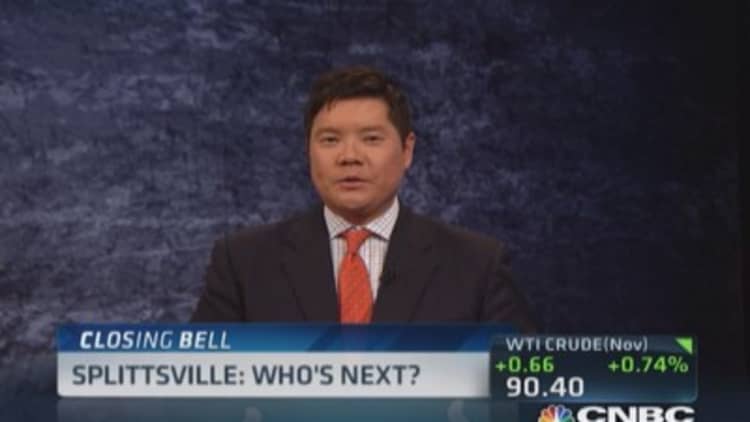Hewlett-Packard, eBay, Barnes & Noble—the rash of spinoff announcements this year has been dizzying. Should investors cheer on for more or take caution?
About 62 spinoffs are likely to be completed in 2014, the highest level since 66 transactions in 2000, according to research firm Spin-Off Advisors. The trend looks set to continue into next year, with many more deals already announced that won't close till then and plenty of activists pressuring companies to break up.
The rise of activist hedge funds is an obvious explanation for the spike in spinoffs. Those funds often identify divisions of companies that arguably have no real connection with the other businesses and suggest they would be worth more as standalone stocks. Activist Carl Icahn, for instance, called for the pending breakup of eBay and its PayPal online payments business earlier this year.
Indeed, activist hedge funds have $93 billion under management and have attracted $14 billion in new inflows from investors so far in 2014, according to research firm eVestment. Activist funds now account for a healthy 16 percent of total assets managed by "event driven" hedge funds, eVestment said.
Read More HP split: Death of the hardware superstore
But it's not just activists telling companies to split apart. "Over the last four or five years there's been a push toward corporate clarity and a push toward getting back to core businesses," said Robert Kindler, global head of mergers and acquisitions at Morgan Stanley. "It's institutional shareholders as much as activists who want to have companies focus on a core business."
The flipside: Certain acquisitions that might have happened in the past are unlikely to happen now. Conglomerates once poured money into disparate businesses backed by a belief that they could perform better with a strong balance sheet and a centralized management team. General Electric famously owned businesses ranging from oven manufacturing to media concerns while Fortune Brands produced liquor and golf equipment.
Today, most companies would have a hard time convincing shareholders that conglomerates work. "The era of formation of conglomerates is over—at least for now," Kindler said. "I don't see a new conglomerate, like a Fortune Brands, being formed anytime soon."
Assuming there plenty more spinoffs to come, how should investors respond? Both parent companies and spinoff companies tend to outperform the broader market after transactions occur, according to Joseph Cornell, president of Spin-Off Advisors.
The real juice is in the spinoffs, which tend to outperform the market significantly for two to three years after they become independent stocks, Cornell said. One reason is that newly independent managers can run companies in a more entrepreneurial way, pursuing new growth ventures and streamlining production methods.
Spinoffs also tend to outperform because they are five times more likely than similar standalone companies to be acquired, Cornell said. Those deals often happen with a few years of their separation.
Read MoreThird Point has 'significant' position in eBay

Even so, there are risks to consider when investing in small spinouts. Spun-out companies sometimes fall off the radar of major investors that are only allowed to invest in stocks of a certain size. Research analysts who cover the original companies often don't follow the spinouts once they are gone. In turn, the stocks may also trade on very low volume, making them prone to extreme price movements when investors sell large amounts of stock.
And with many stocks trading at or near record multiples, there may be some companies that pursue spinoffs for a purely financial reason: certain businesses they own currently command very high valuations in the market. But if valuations were to come down—or even stop expanding—spinoffs could run into trouble fast. Investors who want to hang onto spinoffs should be sure to do their homework.

